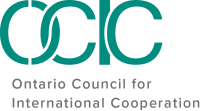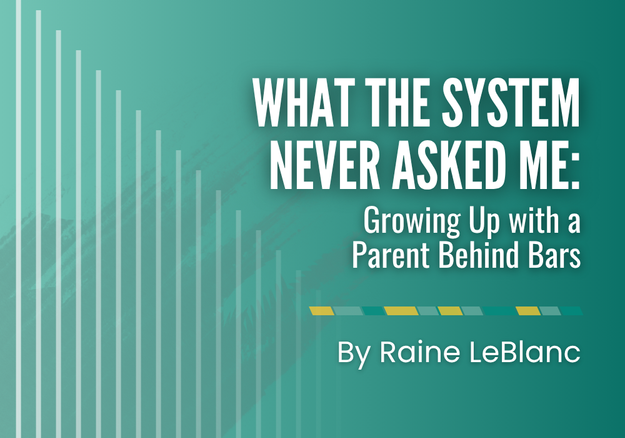What the System Never Asked Me: Growing Up with a Parent Behind Bars
Raine LeBlanc | October 15, 2025
I learned early on to decode navigating education, mental health, and child-welfare systems, but not every child with a parent behind bars can say the same.
The society we were born and raised to live in, was not built to amplify the voice of a child riddled with fear of how the government and the justice system will treat them. When a parent is forcibly removed from the home, it’s only a matter of time before all they knew is gone in an instant. Whether that’s good or bad – depends on each family behind their closed doors. Regardless of this, we leave children unprepared for what to do next.
When a parent is incarcerated, there are psychological, financial, and societal changes the family goes through. Depending on the nature of the crime and arrest, it can be traumatic to lose a parent from incarceration. Regardless of if that parent was the breadwinner of the family, the bills still need to get paid. Even though it was your spouse, your parent, your sibling – the stigma still falls on you. While the Government of Canada does have support mechanisms for disparities such as financial hardship, psychological services such as therapy, and have passed bills that support interconnected communities; they exclude a hidden population who needs these services catered to their experiences, and needs.
Youth with incarcerated parents represent a deeply overlooked population – so much so that we lack even accurate data on how many children are currently impacted. Estimates vary, but between my research between Kids with Incarcerated Parents Canada, and Canadian Friends Service Committee; it’s estimated between 375,000-450,000 children in Canada have a parent in jail.
"Estimates vary, but between my research through Kids with Incarcerated Parents Canada, and Canadian Friends Service Committee; it’s estimated between 375,000-450,000 children in Canada have a parent in jail."
Navigating systems that weren’t built for someone like me was a challenge to my self-worth, my sanity, and my drive. Stemmed from my experience navigating education systems, the lack of resources that educators have on supporting youth with incarcerated parents need to be updated and regularly practiced. Due to persistent stigma and legitimate concerns around child safety, many youth with incarcerated parents remain reluctant to self-identify – leaving their needs invisible in data, policy, and program design. Although our data is somewhat represented through interconnected identities such as (but not limited to): Families in Poverty/Low-Income families, marginalized families, families of color, families with disabilities, etc. It’s essential we re-shape the policies that affect these youth and their limited access to mental health, education, and child-welfare systems; and to consider this underrepresented and often overlooked demographic within youth when reshaping these policies as we evolve as a society.
This invisibility doesn’t end with data; it extends into the very spaces where decisions are made. Youth with incarcerated parents are rarely seen in leadership, and almost never consulted in the policies that shape their lives.
The result? Programs that miss the mark, and systems that continue to fail us.
Spotlighting youth voices that are actively navigating these systems, will enable us to gather data to identify the changes needed to be made to better suit their needs. As these youth navigate these evolving complex situations that occur from the adversities they are at risk of facing, the government needs to evolve with those complexities too.
Sadly, I can’t change my experience, and I can’t stop crime either, but I can work towards creating a sustainable future for children with incarcerated parents.
What does that look like for me?
- Mental health support in context that’s relatable to the complex circumstances of youth with incarcerated parents
- Education policy reform for improved funding and adequate resources in academia (scholarships, guidance counsellors experienced in community justice, etc.)
It’s from this lived experience – and the gaps I’ve witnessed firsthand – that Aspire 2 Heal was born. Not as a solution to every injustice, but as a focused effort to build scholarship pathways, advocate for trauma-informed academic environments, and ensure mental health services reflect the lived realities of youth with incarcerated parents.
What the system never asked me was what I needed to heal, to learn, to lead. So, I built Aspire 2 Heal to answer that question – not just for myself, but for youth still waiting to be seen. It’s time we stop asking youth to adapt to broken systems and start asking systems to adapt to us.
"It’s time we stop asking youth to adapt to broken systems
and start asking systems to adapt to us."
At Aspire 2 Heal, I’ve built a scholarship-mentorship initiative for girls and gender-diverse youth who need financial assistance and guidance to navigate post-secondary pathways in healthcare-related studies. I’ll be facilitating the program myself, drawing from my own experience as a youth with an incarcerated parent. An experience that shaped my understanding of what support truly means; I know firsthand how isolating and complex that journey can be. This initiative is designed to meet those realities with care, strategy, and community.
 Raine LeBlanc OCIC Youth Policy-Makers Hub Member & Founder of Aspire 2 Heal
Raine LeBlanc OCIC Youth Policy-Makers Hub Member & Founder of Aspire 2 Heal
Raine (she/her) is a passionate advocate for inclusive policy reform, community healing, and youth empowerment, driven by a vision of justice without barriers. Her work bridges non-profit leadership, healthcare administration, and justice advocacy, with a focus on uplifting underrepresented communities and transforming systems from within. She is the founder of Aspire 2 Heal, an initiative supporting youth with incarcerated parents who are pursuing healthcare-related studies.







